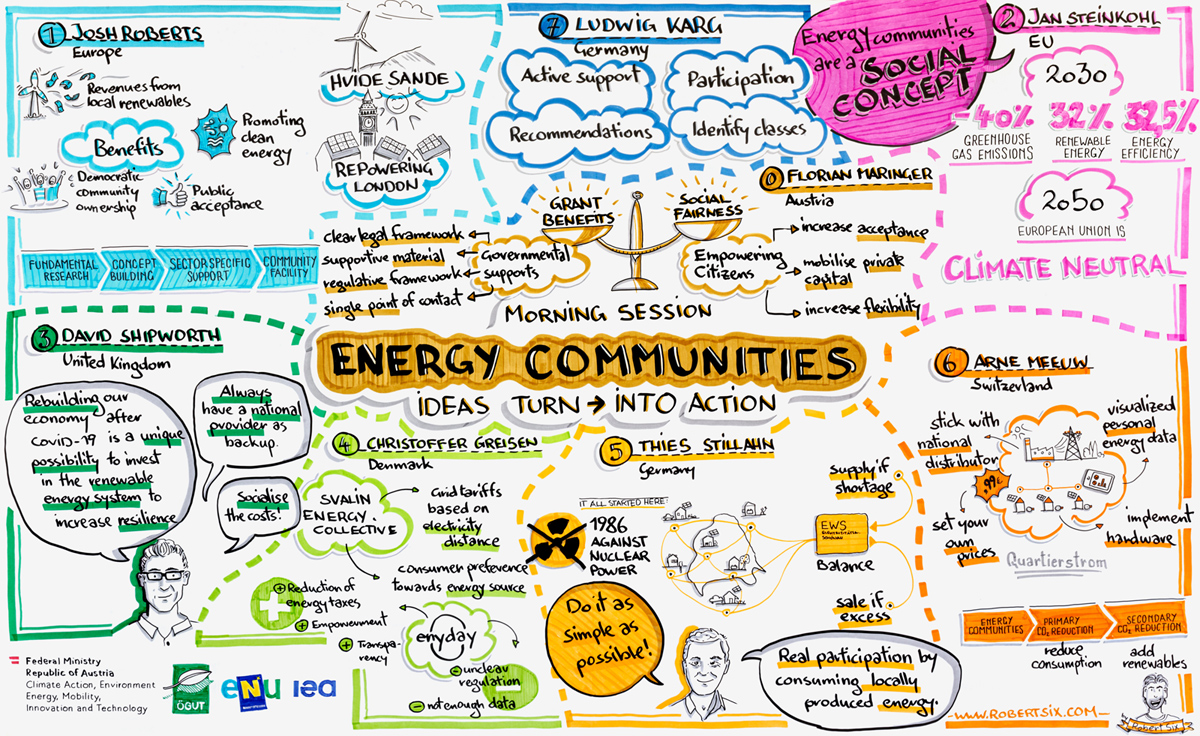Mission Innovation Austria Online Event: Energy Communities - Findings from Innovation Programs and Pilots
Organizer

Austrian Federal Ministry for Climate Action, Environment, Energy, Mobility, Innovation and Technology in Cooperation with Klima- und Energiefonds, Standortagentur Tirol, Energie Tirol

Documentation
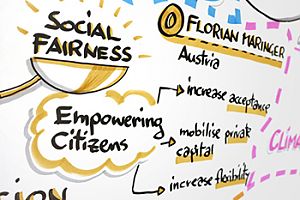
In particular, two questions were examined in the workshop:
- How can Renewable Energy Communities (RECs) contribute to a sustainable energy system?
- What are the unknowns of RECs – technical, political, social and economic?
To answer these questions, findings from existing initiatives and pilot projects were derived and discussed. The session, which was attended by over 300 participants from 28 different countries, was opened by Florian Maringer (BMK).
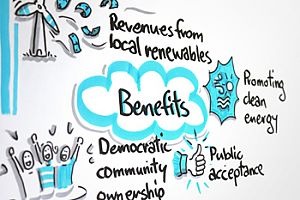
After introductory words of the EGRD Chair, Birte Holst Jørgensen, Josh Roberts (REScoop) addressed in his keynote the opportunities and challenges that arise from renewable energy cooperatives and gave recommendations for research & development to support the implementation of energy communities. Among other things, energy communities should be defined as non-commercial market actors and market barriers should be reduced. Sector-specific support for energy communities and the promotion of inclusion (gender aspects, low-income households etc.) also play an important role.
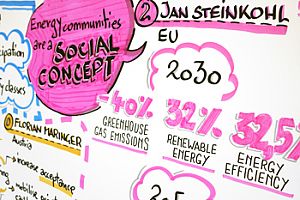
The energy policy context and the provisions regarding Energy Communities at European level were the subject of the presentation by Jan Steinkohl (European Commission). Energy Communities should be understood as a social rather than a technical concept. The necessary framework conditions to implement them include enabling all customers to participate and using tools that promote access to information and finance.
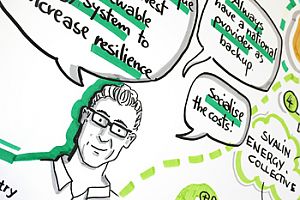
National implementations of energy communities and their drivers and barriers were then presented by David Shipworth (University College London, UK), Christoffer Greisen (DTU Electrical Engineering, Denmark), Thies Stillahn (Elektrizitätswerke Schönau, Germany) and Arne Meeuw (Exnaton, Switzerland).
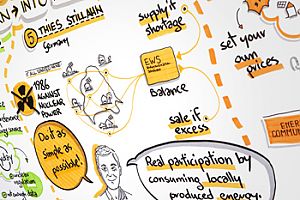
According to the experts, the challenges lie in the upscaling of individual pilot projects, as they are not yet out of the demonstration stage. One of the key tasks for the future is also to align currently different values in different areas, such as economic and social values, through political and regulatory measures and incentives. It is necessary to investigate how the costs of infrastructure and the risks of local inequalities can be socialised and, on the other hand, how the formation of ghettos can be avoided. For future R&D activities the development of models for the provision of real-time data is mentioned among other things.
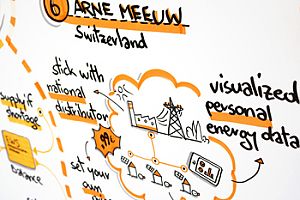
The experts agree on the involvement and acceptance of local stakeholders – this is crucial for overcoming barriers and for the success of the Energy Community. The best practice examples described show that energy communities can promote the use of renewable energy sources also in existing buildings and thus reduce CO2 emissions. Furthermore, the involvement of communities and their participants in the electricity market can have a positive impact on grid stabilization and flexibility management.
Presentation Slides from
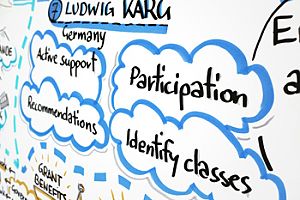
The morning session was concluded by the presentation of the European Task Force on Energy Communities by Ludwig Karg (B.A.U.M. Consult), who is working on an overview of the state of affairs in various EU countries and tries to show how the development of these can be further facilitated.
Content Description
09:00 Online Registration
09:30 Opening
Florian Maringer, Federal Ministry for Climate Action
MORNING SESSION
Energy Communities – Ideas turn into actions
10:00 - 12:00
The aim of the workshop is to provide insights in energy community examples of the electricity sector, the opportunities and challenges they pose for current market and regulatory arrangements, and how they might be further facilitated. In this workshop, we will focus on two fundamental questions:
How do Renewable Energy Communities (RECs) contribute to a sustainable energy system?
- What characterizes a renewable energy community (ownership structure, governance and purpose)?
- What are the pros and cons of RECs in fostering the energy transition?
- What is the business model of energy communities, not least regarding access to financing instruments or partnership schemes?
- How do RECs influence the electricity system with respect to security and climate protection?
What are the unknowns of RECs - technical, political, social and economic?
- Which aspects are addressed by ongoing R&D projects with respect to REC?
- How can R&D support the further implementation of REC?
- Which role do RECs play in large-scale energy labs/show case regions?
10:00 Welcome
Birte Holst Jørgensen
10:05 Strenghtening local energy transition with cooperative approaches
Josh Roberts, REScoop
10:20 Local Energy Communities and EU Legislation
Jan Steinkohl, DG Energy, European Commission
10:35 National implementation of energy communities – drivers, barriers, best practices
- David Shipworth, University College London, UK
- Christoffer Greisen, DTU Electrical Engineering, Denmark
- Thies Stillahn, Elektrizitätswerke Schönau, Germany
- Arne Meeuw, Exnaton, Switzerland
11:30 Questions & Answers
11:45 Taskforce Energy Community
Ludwig Karg, B.A.U.M. Consult
12:00 End
The online event will be held in English.
Target audience
In addition to EGRD members and national experts, we are seeking input from social scientists, behavioural economists, RD&D decision-makers, strategic planners and programme managers from industry, academia, think tanks, national laboratories, NGOs and government.
Expected outcomes
The online event will result in a summary report that identifies challenges and opportunities of energy communities and present perspectives for R&D planners and strategists.
Session hosted by
- IEA Experts' Group on R&D Priority Setting and Evaluation (EGRD)
- Supported by: Österreichische Gesellschaft für Umwelt und Technik (ÖGUT) and Energie- und Umweltagentur des Landes NÖ (eNu)

Contact
- Herbert Greisberger, Energie- und Umweltagentur des Landes NÖ
- Hannes Warmuth, Österreichische Gesellschaft für Umwelt und Technik
Hannes.Warmuth@oegut.at
AFTERNOON SESSION
Different Flavors of Energy Communities
13:00 - 16:00
Different approaches to energy communities are emerging in Europe. Aim of the session is to understand how these approaches can be accommodated within the EU provisions for renewable and citizen's energy communities and what the role of approaches outside the EU regulation is. The discussions are part of a work stream under the EU BRIDGE cooperation taskforce on energy communities, aiming to involve experts and projects from Austria.
Presentation slides of the Afternoon Session
Agenda
- Experiences with collective self-consumption in France, Alexandra Battle, TECSOL
- Approaches for collective industrial self-consumption, Leen Peeters, THINK-E
- Energy positive districts as nucleus for energy communities, Andraes Tuerk, JR and Adriano Bisello, Eurac
- Digital Energy supply and demand response systems, Natalie Samovich, tbc
- Municipal utilities as energy communities N.N tbd
Interactive Session: Contributing to the European Task Force on Energy Communities
- State of Play of the European Task Force
- How Experts and Projects can contribute
Moderation: Ludwig Karg (B.A.U.M. Consult), Leen Peters (Th!nk E), Andreas Tuerk (Joanneum Research)
13:00 Welcome and introduction
- Michael Hübner, Federal Ministry for Climate Action
- Hemma Bieser, AvantSmart
13:10 Energy Communities – a means to an end
Leen Peters
13:20 The Task Force on Energy Communities
Ludwig Karg
13:30 Examples for the flavours of Energy Communities
- Collective generation and trading in the Netherlands
Job Swens, J-OB - Experiences with collective self-consumption in France
Alexandra Battle, TECSOL - Housing associations as energy communities: FlexShape in Denmark
Prof. Torben Bach Pedersen, Aalborg University - Energy positive districts as nucleus for energy communities
Andreas Tuerk, JR - About islands and other autonomous communities in Greece
Takis Ktenidis, TILOS project - Local utility operating on behalf of and supporting the citizens
Gerhard Meindl, Stadtwerke Wunsiedel, Germany - Financial Aggregation and Investment
Josh Roberts, RESCOOP - Local organizations for fostering energy efficiency: ALLIES in Hungary
Gergely Toth and Katalin Herner, KÖVET, Hungary - Jointly providing flexibility and grid services while charging EVs
Tereza Borges, Lumenaza, Germany / UK - Digital Energy supply and demand response systems
Natalie Samovich, ENERCOUTIM
15.00 Interactive Session: How you can you contribute to the European Task Force
Ludwig Karg, Leen Peters, Andreas Türk
15:45 Wrap-up and Closing
Michael Hübner, Hemma Bieser
16:00 End of first MIA Online Event
Session Organizer
- Andreas Tuerk (Joanneum Research)
- Ludwig Karg (B.A.U.M. Consult)
Session hosted by
- EU Task Force on Energy Communities
- Joint programming Platform ERA-Net Smart Energy Systems
- supported by: Joanneum Research and B.A.U.M. Consult München / Berlin

Guidelines and Data Declaration
- The Meeting will be recorded. The recording and presentations are made available later.
- You are kindly asked to remain muted and keep your camera switched off during the meeting.
- You can address your questions and remarks in the chat. Please be as concise as possible. The moderator will group questions and then address them to the speakers.
- Please be aware that your name will be displayed online in the list of participants as well as in the chat window.

